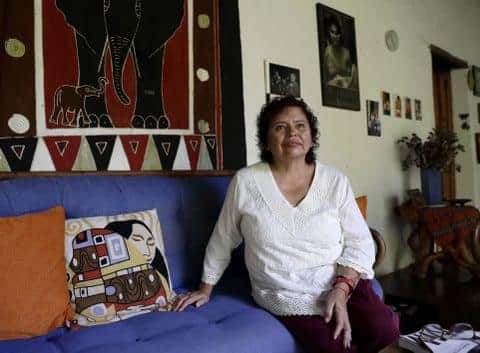
Morena Herrera, who fought for Beatriz’s rights from start to finish
PHOTO by R Sura/EPA-EFE/Rex, The Guardian, 2/12/24
Finally! The Inter-American Court of Human Rights (IACHR) found the government of El Salvador responsible for violating the rights of Beatriz, whose name was an international byword in the abortion rights movement in Latin America for years. She was a young Salvadoran woman who was denied an abortion of an anencephalic fetus by a country with a total ban on abortions.
The Costa Rican-based IACHR, the inter-American regional human rights court, said the government was responsible for obstetric violence, health violations and violating the physical integrity of Beatriz, who in addition to the fetus, had serious health issues of her own. The Court had a total lack of protocols for high-risk pregnancies, which led to her care being “bureaucratized and judicialized” in 2013. Early in her pregnancy, Beatriz had requested and was denied an abortion in spite of the unviability of the fetus, which died hours after delivery. She herself died after a traffic accident in 2017.
The case was brought by a group of organizations who demanded reparations for her family.
The court ordered El Salvador to pay damages amounting to US$75,000, to be divided among some of Beatriz’s relatives, including her first-born surviving son.
The 2013 pregnancy was Beatriz’s second. She had already been diagnosed with lupus, an auto-immune disease, and rheumatoid arthritis, among other illnesses. Her first pregnancy had been complicated as well, requiring two hospitalizations for herself and a 38-day hospital stay for her baby after birth.
During her second pregnancy, after the fetus was diagnosed as anencephalic — a congenital defect characterized by an under-developed brain and skull — a 15-person medical committee recommended her pregnancy be terminated at 14 weeks to avoid undue risks to Beatriz’s health, according to testimony before the Court.
El Salvador’s government had argued unsuccessfully that the medical team had the autonomy to decide the best course of treatment for Beatriz and to try to preserve the life of the fetus.
The Inter-American Commission on Human Rights, which sent the case to the IACHR, said their response, in effect, was that “legally [abortion] is not permitted in the country”.
Morena Herrera, president of the Citizen Group for the Decriminalization of Abortion in El Salvador, who supported Beatriz’s case from the beginning and through all these years, said shortly before the decision was announced, that a finding in favor of Beatriz would be “very important for women’s human rights and especially the right to health”. We hope she’s right.
SOURCE: Associated Press (AP) News, by Yolanda Magaña, 20 December 2024



